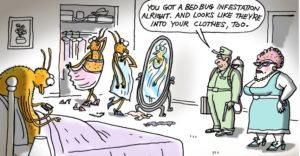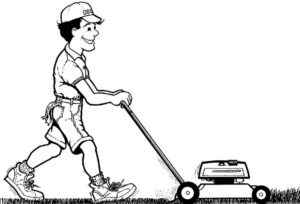
Who should pay for lawn care, pest control and utilities. Fortunately, they are almost always the responsibility of the tenant when renting a home in my area. However, I talk to landlords from all over and it seems that this does vary from area. Your job is to know what is considered “normal” in your area so you don’t end up paying for something you shouldn’t.
I just had an interesting talk with a lady who was interested in renting a home. Notice I said “was” interested. When she found out she had to cut the grass, keep the weeds under control, clean the gutters, be responsible for pest control and pay her own utilities, she decided she wasn’t interested.
Who should pay for lawn care, pest control and utilities? You or the tenant? Click To Tweet
Disbelief
This lady had lived in an apartment for 16 years and had never been responsible for lawn care, pest control and utilities. She was completely blown away that any tenant was ever have to do any of these things. After all, she didn’t own the house and it wasn’t her job to take care of anything! She just wanted to live there.
That last statement had me worried! Even living in an apartment, she is still responsible for keeping her unit clean and livable.
Reality Check
The reality is that landlords that have a lot of rentals are not usually going to be in a position to assume the lawn care, pest control and utilities for every one of their rentals. Who should pay for lawn care, pest control and utility bills is not even a question. It is just not economically feasible to assume the cost of all of these things.
The main reason to own rentals is to make money. It becomes your job to educate your new tenant and make sure he understands what is expected. Most people are not shocked or upset because they expect to do these things.
Who Should Pay For Lawn Care
In my area, there is no question as to who should pay for lawn care. It is just accepted that for houses, the tenant is responsible for the upkeep of the yard. That includes cutting the grass, weed wacking, cleaning the gutters as well as picking up trash. It is just what they have to do in order to rent a house.
This is spelled out in the lease that every tenant has to sign. This is non-negotiable.
“Tenant shall keep the lot mowed, the shrubs trimmed neatly and weeds away from the exterior air conditioning condenser. The Tenant shall not leave trash in the yard or dump large items in the yard. If rental property is a single-family house, Tenant shall be responsible for cleaning gutters twice yearly. The Tenant will be given one written notice and five days to comply if violations are brought to the landlord’s attention. The following fees apply if Tenant does not cut the grass, trim the bushes, clean the gutters or pick up trash and other items dumped in the yard following a written notice:
$100.00 charge each time owner’s maintenance staff cleans gutters.
$50.00 charge each time owner’s maintenance staff cuts the grass.
$75.00 charge each time owner’s maintenance staff trims bushes.
$150 dump charge plus total man hours used to clean up debris, trash and any other items dumped in yard.”
Exceptions To The Rule
Even if your lease states that the tenant takes care of yard work, there may be an occasion when you will make an exception for lawn care. Every so often you may find out that a tenant that has been with you for many years maybe has surgery, has a death in the family, etc. In this case, you agree to cut the grass and weed eat for a short period of time as a favor at no charge.
Problem tenant’s that do not cut their grass can also be flagged by your local code enforcement or local home owner’s association which will cost you money! Again, you need to address this issue in your lease. Make sure the tenant understands that he is responsible for all fines and any fees if you cut the grass. When you have a house that is fined, you can run over, take care of the problem and charge the tenant. Be sure and keep an eye on this house in the future.
Problem tenant’s that do not cut their grass can also be flagged by your local code enforcement or local home owner’s association which will cost you money! Click To Tweet
I know of a couple of cases where the tenant will not cut the grass. The landlord will pay to cut the grass two or three times a month. The tenant is charged and pays the landlord. It is not the ideal situation, but it is workable. If the tenant doesn’t pay, you don’t accept rent until he does and it may mean evicting the tenant.
Pest Control
Pest control can be a sticky thing. It is always a good idea to treat every vacant property after it is cleaned up. That helps to prevent a lot of problems and you can point out that the unit has been treated when you rent it.
Providing pest control for apartments is pretty much the standard around here. You can usually negotiate with a local pest company to spray once a month for not too much money. It is a lot cheaper than having to treat for a roach infestation after the fact! You have multiple tenants that are unhappy and it is much more costly to fix.
But, pest control in homes is typically the responsibility of the tenant. When the tenant comes into the office to sign the lease, he is told that the home has been treated as a part of routine maintenance. It is now his job to spray the home as needed to keep pests out. I always recommend that they spray the first of every month just to stay on top of things.
Are Bugs A Problem?
The bottom line is that bugs can be a huge problem in rental properties. Some tenants are very clean and never seem to have more than an occasional spider. Other tenants live like complete pigs and draw every bug within a ten mile radius! It is gross. Bugs can be extremely difficult to get rid of in an occupied home. You will need to decide whether or not you want to treat.
Many landlords offer special incentives to their tenant’s right before the lease is due to be renewed for another year. One local landlord sets up an appointment to have each of his rentals professionally treated on or around the one year mark. He says his tenants love it and said he has very few bug problems.
Bug Infestation – Real Life Case
Maintenance called the office once day really upset. A Section 8 tenant had a roach infestation that wasn’t there during the last certification. They were literally crawling all over him while he tried to fix the furnace. He took a video and sent it to us! This is a home that is inspected every single year by a Section 8 inspector. She had lived there 10 years and there were never any roaches noted.
Section 8 finally decided that she was responsible for getting rid of them as they weren’t there before. However, she had no money and they refused to re-certify the home until the roaches were gone! The landlord ended up paying to have the place treated and it was quite costly. This ended up being a food storage issue and the pest company talked to her about how to prevent this in the future.
The home hasn’t been inspected again this year so fingers are crossed! I hope they are not back.
Utilities
Landlord with apartments or multi-family units often find that they have to pay for all or some of the utilities in their buildings. For example, it can be difficult to separate out water usage with a multi-family unit and tenants will complain. One will say “I was on vacation for 2 weeks so I shouldn’t have to pay for a full month.” Another will say, “It’s just me and all of my neighbors have four people in their families.” It is much easier to figure out how much the water is each month and add that to the cost of the monthly rent when you sign the lease. Don’t even mention how much is for utilities. Just say the rent is ___ and let it go.
Residential homes are a different story when talking about who should pay for lawn care. In most area, the tenant pays for all utilities themselves. Let’s face it, the cost of gas, electric and water for the same house can vary wildly from tenant to tenant. If you are paying for it, they aren’t going to care if all three kids take hour long showers or that every single light and television runs 24/7. When your tenants are responsible for paying these bills, they will be much more careful. For new tenants, the utilities will be in the landlord’s name and I usually give them up to three days to get them transferred. Then I have the utilities shut off!
In Conclusion
Who should pay for lawn care, pest control and utilities in rental properties tends to be a hotly debated topic with lots of different opinions. In the end, you have to look at your bottom line and what is common in your area, and decide what is best for you. You will have an occasional person have a fit that you don’t pay for everything but that is just too bad.

